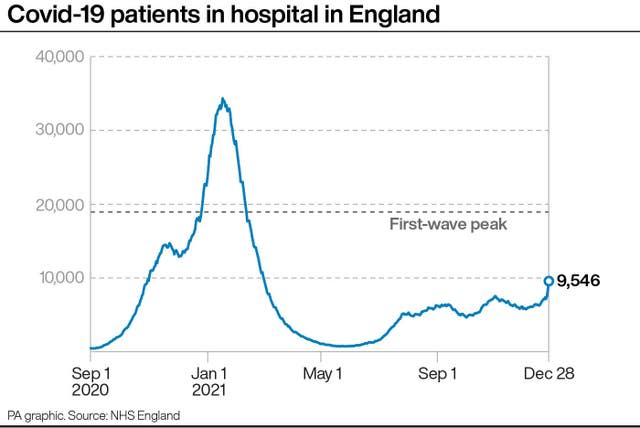NHS in new booster jab drive as Covid cases continue to rise

The NHS is mounting a fresh drive to get Covid booster jabs into arms to protect against the fast-spreading Omicron variant.
The NHS vaccination programme is sending around 650,000 text messages and 50,000 letters to people who have not yet received their top-up dose, encouraging them to roll up their sleeve and have a “jabby new year”.
The move comes as ministers continue to monitor the latest data with England and Wales recording a record 129,471 confirmed cases on Tuesday, while separate figures for Scotland showed another 9,360 cases.
No data was available for Northern Ireland.
All adults are now eligible to book a #COVID19 booster dose.
If the booking service is busy, please try again later or search for a walk-in site. More info: https://t.co/95odTgmvQS pic.twitter.com/SJNrJlfgMc
— NHS (@NHSuk) December 28, 2021
The Government at Westminster has said while the early evidence suggests Omicron is less likely to cause serious illness than earlier waves it stands ready to impose new measures in England if necessary.
Currently England is alone among the home nations in ruling out additional controls before the new year, with Scotland, Wales and Northern Ireland all having put in place further controls since Christmas.
Despite rising Covid-19 case across the UK, Health Secretary Sajid Javid said on Tuesday that he “cannot see how restricting outdoor exercise is justified or proportionate” after Parkrun cancelled its free, 5k runs in Wales as the country’s restrictions prevent gatherings of more than 50 people.
First Minister Nicola Sturgeon, who will update the recalled Scottish Parliament on Wednesday, has called on people in Scotland to follow the new rules, including restrictions on households mixing, as she warned cases would continue to rise.
According to the latest figures, there are 9,546 people in hospital in England with the disease – up 38% from a week earlier and the highest total since the beginning of March, although still well below the peak of more than 34,000 in January.
Meanwhile research from the Intensive Care National Audit and Research Centre found three in five Covid patients in intensive care in London at the start of last month had not been vaccinated.
NHS national medical director Professor Stephen Powis said the figures underlined the importance of people getting fully vaccinated to protect themselves and to protect the health serves.
“While that does not necessarily tell us exactly what is going on in hospitals now, it tallies with what we are hearing from staff on the frontline,” he said.

“Getting vaccinated… means that you are much less likely to end up in a hospital bed that could otherwise be used to treat someone else.”
NHS staff administered 244,078 vaccinations on Monday, including 209,626 boosters, the second-highest tally for a bank holiday.
According to the latest Government figures 51 million people in the UK have had a first dose of the vaccine and more than 32 million have received a third shot.
Meanwhile NHS leaders have warned that currently the greatest pressure on the service is coming from Covid-related staff absences which are leaving clinical teams severely depleted rather than from Covid hospitalisations.
Some scientists and business leaders have suggested ministers should consider further reducing the self-isolation time for people who test positive to enable them to get back to work and prevent essential services collapsing.

The Health Secretary has already reduced it from 10 to seven days in England while in the United States it has been cut from 10 days to five for people who are asymptomatic. Scotland, Wales and Northern Ireland have yet to make any changes.
The president of the CBI, Lord Bilimoria, pointed out that South Africa – where Omicron was first detected – had gone further dropping the requirement to self-isolate altogether for those who are asymptomatic.
“We have got to do everything we can to stop the disruption to our lives and to our livelihoods and to the economy in as safe a way as possible,” he told the BBC.
“We need people to isolate for as little time as possible.”
Paul Hunter, professor in medicine at the University of East Anglia, said ultimately people who test positive for Covid would have to get on with their normal lives “as they would do with any other cold” although “maybe not quite just yet”.


